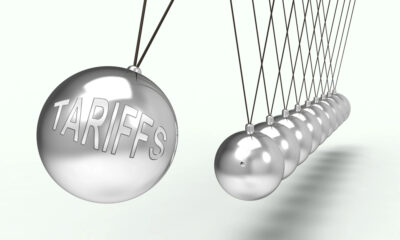Jon Murphy is an assistant professor of economics at Nicholls State University.
Finance
A nationalist argument against protectionist tariffs

Nationalism is supporting one’s national interests, often at the expense of the interests of other countries. Protectionism and nationalism often go hand in hand, as protectionist tariffs are considered necessary to promote and protect national interests. I am not a nationalist (in fact, I consider it an evil ideology on par with socialism and fascism); here I want to question the link between nationalism and protectionism. I argue that if you are a nationalist, you should be thwart protectionism, because protectionism weakens political and national unity.
Protectionism aims to support, through tariffs and subsidies, various industries identified by the government as essential to serving national interests. These could be military industries (shipping, weapons production, key inputs and natural resources, etc.), technologies (superconductors, AI research, etc.), or goods necessary for national life (food, arts, entertainment, etc.). ). There is, of course, the mundane and general point that resources are scarce and that support for these industries necessarily comes at the expense of other industries. This cronyism may sow the seeds of national strife and division, but it is unlikely that it alone will weaken the political organization.
What is probably more important is the fact that industries tend to cluster and become regional. In technical terms, there are external economies of scale: firms can work together to take advantage of a common resource, reduce transaction costs, or lower other costs, allowing them to produce more at a lower average cost. Well-known examples of these external economies of scale are Silicon Valley, Dalton Georgia, Detroit and the biomedical research cluster in Boston Massachusetts.
The fact that industries cluster rather than being randomly distributed across a country means that protectionism weakens political organization. Certain regions of the nation are favored at the expense of other regions. The other regions may be angry because they are being deliberately harmed at the expense of other groups. In the language of Carl Schmidt, the “friend-enemy” distinction is no longer directed at people outside the nation, but rather at the nation itself; unity is broken when people within the nation see other nationals as an ‘enemy’. These internal divisions then lead to internal divisions and, in extreme cases, to the disintegration of national identity.
In the US, there are several examples of how these regional divisions weaken political relations. The American Revolution was indeed partially fought because of protectionist tariffs. In the list of grievances against “pretend legislation” in the Declaration of Independence, one of which is: “cutting off our trade with all parts of the world”, a reference to the Navigation Acts. The Navigation Acts favored British shipping and trade at the expense of colonial trade. This in turn made Americans feel discriminated against and inferior as British subjects. Adam Smith, himself a (cautious) supporter of the Navigation Acts, even argued that they were a “plug in that great blood vessel” of commerce and “will introduce the most dangerous disorder into the whole body politic” (Wealth of countries Book IV, Chapter 7, Part III, page 605). How right he was.
After the Revolution, tariffs continued to be a source of debate among the Founding Fathers and the early Congresses. Some, like Alexander Hamilton, wanted the tariffs to raise revenue and disrupt trade as little as possible. Others, such as James Madison and Thomas Jefferson, argued that the new nation should use tariffs to force Britain to open trade with the US. In general, the Hamiltonian idea of a revenue tariff rather than a protectionist tariff won, although there were attempts at protectionism.
The best known and most dangerous of these resulted in the The Annihilation Crisis. Beginning in 1816, the federal government began imposing protectionist tariffs to support Northern manufacturers, but at the expense of Southern manufacturers and farmers. These tariffs culminated in the Tariff of Abominations of 1828. The Southern states, especially South Carolina, were outraged that the federal government was so disadvantaging them. South Carolina openly challenged the authority of the federal government by nullifying the tariff within its borders. Finally, the crisis was resolved in 1833 with a new bill that generally gave South Carolina and the Southern states much of what they wanted. But that event came dangerously close to the disintegration of the newly formed nation (for a longer discussion of this history, see Clash over trade by Douglas Irwin, chapter 2).
More recently, such regionalization of the industry was weaponized by China during the Trump administration’s trade war. By favoring certain industries at the expense of others, the government opened the door to Chinese retaliation. China retaliated by targeting US agricultural exports in regions that were also swing states. These protectionist tariffs created divisions that a perceived enemy could exploit to weaken the body politic.
In conclusion, nationalists should thwart protectionist tariffs because they weaken the nation as a whole. In a small, homogeneous nation-state, where there is little economic diversity, nationalism and protectionism might complement each other (although this is unlikely given that a tariff under such circumstances would lead to a net reduction in national welfare). But that is not the case for most countries of the world today, not least the United States of America.













